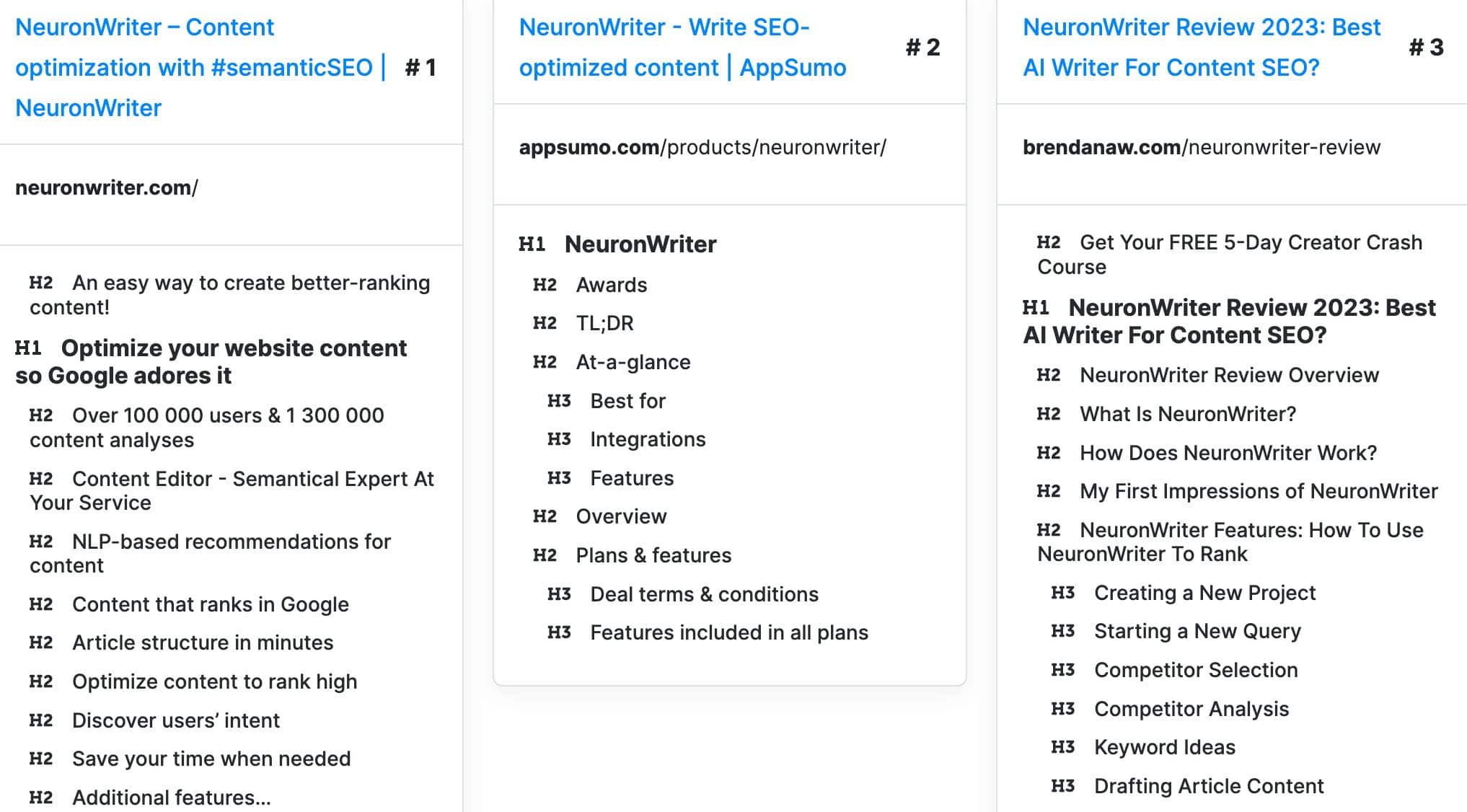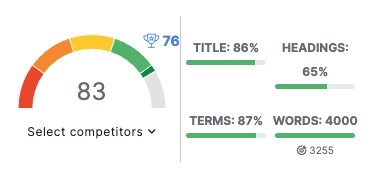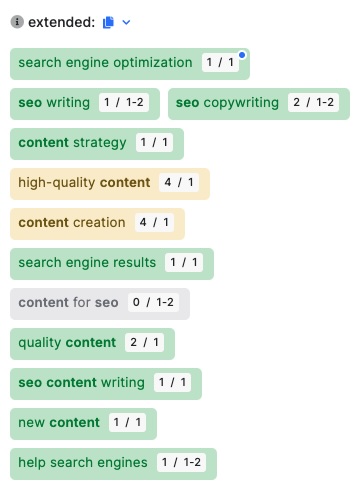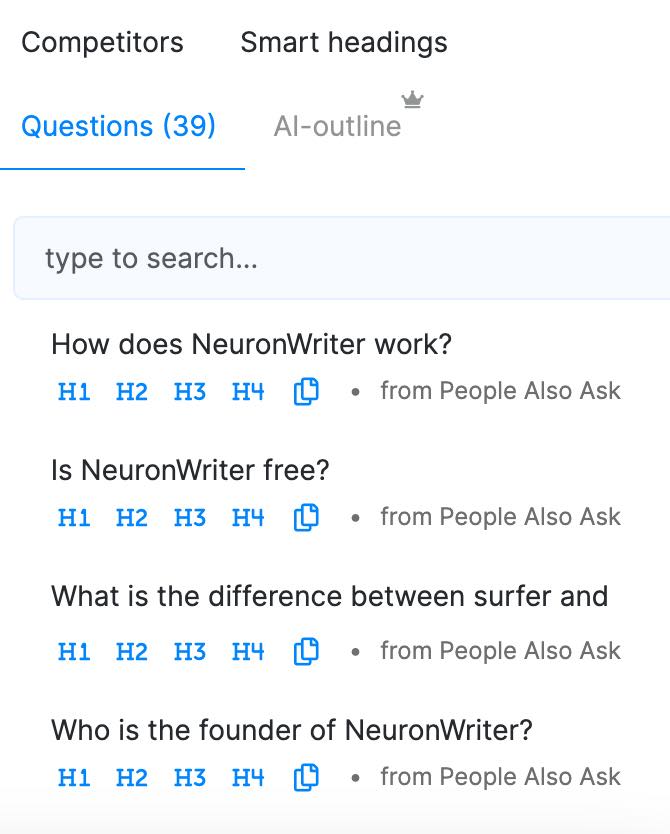Creating high-quality, optimized content that ranks well on search engines is challenging. NeuronWriter is an AI-powered content optimization tool designed to make this process smoother and more efficient. In this tutorial, we explain how to use NeuronWriter’s advanced techniques in your daily workflow.
Table of Contents
What Are the Advanced Techniques in NeuronWriter?
NeuronWriter’s advanced techniques include features like automated headings, FAQ generation, content scoring, and more to create high-value content optimizes to rank well on search engine results. These tools enhance the quality, structure, and SEO of your content, making it more competitive in the search results.
Ready to optimize your content like a pro? Check out NeuronWriter today! Use it to create high-ranking articles that stand out from the competition.
For a general overview of NeuronWriter, check out AI Tools Overview for Content Creation.
NeuronWriter’s Advanced AI and NLP Tools for Content Optimization
Competitor SERP Analysis for Content Planning
Before diving into content creation, use NeuronWriter’s Competitor SERP Analysis to get insights from top-performing articles that are ranking in the top positions for your target keywords.

NeuronWriter’s SERP analysis evaluates factors such as keyword usage, content structure, readability, and metadata. This helps you pinpoint gaps and opportunities in your content that you might otherwise miss, giving you a roadmap for what to improve or add.
How to Use:
- Enter your target keyword, and NeuronWriter will list the top-performing articles.
- Review the word count, keyword density, content structure, and subtopics used by competitors.
- Identify gaps in their content—what questions aren’t they answering? These gaps are opportunities for you to provide more comprehensive answers.
Pro Tip: Look for frequently mentioned subtopics, common headings, and recurring themes in competitor articles to ensure your content is just as thorough, if not better. This is effective when writing long-form guides or in-depth articles.
Content Score Feature
NeuronWriter’s Content Score evaluates the SEO readiness of your article, considering various factors like readability, keyword usage, and structure. By studying competitors’ content scores, you can create more optimized and targeted content. NeuronWriter’s AI tools suggest enhancements based on this analysis, ensuring your content aligns with user intent and search engine requirements. This increases your chances of ranking higher on SERPs.

Content Score Optimization Tips:
- Keyword Density: Use NeuronWriter to monitor keyword density and avoid keyword stuffing. Aim for a balanced keyword frequency to maintain SEO without sounding unnatural.
- Headings: Properly utilize H2 and H3 tags. NeuronWriter will prompt you if your headings need adjustment or if you’re missing relevant subtopics.
- Readability: A high Content Score often correlates with better readability. Keep sentences clear and concise. Aim for a readability score that matches your audience’s preference.
Table: Example Content Score Breakdown
| Factor | Your Content Score | Ideal Score | Recommendations |
|---|---|---|---|
| Keyword Density | 2% | 1.5%-2.5% | Maintain current keyword usage |
| Readability | 75/100 | 80/100 | Simplify language in key sections |
| Heading Structure | 90/100 | 95/100 | Add more subheadings |
| Content Length | 1,200 words | 1,500 words | Expand sections with examples |
NLP-Based Term Suggestions for Semantic SEO
Search engines are becoming more sophisticated, relying heavily on understanding the context of content through semantic analysis. NeuronWriter uses Natural Language Processing (NLP) and NLP-based term suggestions help you incorporate semantically relevant keywords that enrich your content.
This improves the depth and quality of your content by integrating closely related terms, increasing your chances of ranking for long-tail keywords.

Example: If you’re targeting “content optimization,” include terms like “improve website content,” “SEO ranking factors,” and “content quality analysis” to capture a broader audience.
Benefits of NLP Optimization for SEO
NLP helps search engines better understand content context and relevance, which can improve rankings in several ways:
- Better User Intent Matching: NLP techniques help align content with user search intent, improving relevance and potentially boosting rankings.
- Improved Semantic Relevance: NLP allows search engines to grasp the meaning and intent behind content, not just keywords. This helps match content more accurately to user queries.
- Enhanced Content Quality: Using NLP-suggested terms and topics helps create more comprehensive, in-depth content that covers a subject thoroughly.
Steps to Follow:
- Use the suggested NLP terms to add depth to your content without overusing primary keywords.
- Integrate suggested synonyms and related terms naturally throughout your article.
- Focus on long-tail keywords and semantically related phrases that match user intent.
Automated Headings for Better Structure
One of the standout features of NeuronWriter is its ability to automatically generate relevant headings for your content. Properly structured headings are crucial for readability, SEO, and user engagement.

Example Use Case: If you input a general topic like “Best AI Writing Tools,” NeuronWriter can instantly create well-structured and engaging headings like:
- “Why Choose AI Writing Tools for Content Creation?”
- “Top Features to Look for in AI Content Tools”
- “How AI Can Transform Your Writing Workflow”
In-Depth FAQ Generator
NeuronWriter’s FAQ generation feature is perfect for building a comprehensive section based on questions your target audience frequently asks. This feature leverages AI to extract common queries, helping you to rank higher on Google’s “People Also Ask” section.
Tips for Effective FAQ Optimization:
- Use AI-generated questions that align with user search intent.
- Keep answers concise, typically 40-60 words per answer.
- Include primary and secondary keywords in the questions and answers.
Example: If you’re writing about “Content Optimization,” NeuronWriter could generate FAQs like:
- “What are the best tools for content optimization?”
- “How does content optimization improve SEO?”
- “What is the role of AI in content optimization?”
Auto-Insert-Terms Feature for Targeted Keywords
NeuronWriter’s Auto-Insert-Terms is an automated feature that finds relevant yet unused keywords in your content. This feature can boost keyword diversity without compromising the natural flow of the article.
Best Practices:
- Let the tool suggest synonyms and alternative keywords you might have missed.
- Use the auto-inserted terms sparingly—quality over quantity is key.
- Review all AI-inserted terms for context and relevance to ensure they fit seamlessly.
Structure Optimization Based on Competitor Analysis
NeuronWriter’s Structure Optimization offers guidelines for formatting your content. These suggestions are based on an analysis of the top-ranking articles in your niche.
How to Optimize Structure:
- Use bullet points and numbered lists to break up text.
- Divide your content into sections using subheadings to improve readability.
- Analyze the content length of competitor articles to decide if your content needs to be longer or shorter.
Internal Linking for Better SEO
Internal links enhance site structure and SEO, guiding users and search engines to related content on your website. NeuronWriter’s Internal Linking Suggestions can identify relevant pages to link to based on your content topic.
Internal Linking Tips:
- Link to high-authority pages within your website.
- Use descriptive anchor text that includes keywords.
- Avoid over-linking to the same page multiple times within one article.
Content Gap Insights
NeuronWriter’s Content Gap Analysis helps identify keywords and subtopics that your competitors are covering but you aren’t. Filling these gaps can increase your content’s comprehensiveness.
Content Gap Tips:
- Use the competitor SERP insights to find gaps in their coverage.
- Add missing subtopics or expand on areas your competitors only briefly mention.
- Consider multimedia (videos, infographics) to fill visual gaps competitors may lack.
Plagiarism Checker
One of the standout features of NeuronWriter is its plagiarism checker. This tool is essential for maintaining the integrity of your content, ensuring it’s unique and compliant with Google’s guidelines. By scanning your text against a vast database, it flags any duplicated content and provides sources. This feature is invaluable for preventing potential penalties from search engines due to copied content
Track Content Success with Performance Metrics
Once your content is live, use NeuronWriter’s tools to monitor its performance. Content Analytics allows you to see how well your content is performing in search engines and if any tweaks are needed.
Key Metrics to Track:
- Organic Traffic: Measure how many visitors are coming from search engines.
- Bounce Rate: If it’s high, consider optimizing your content structure and readability.
- Keyword Rankings: Monitor how your primary and secondary keywords are ranking over time.
- Click-Through Rate (CTR): Adjust meta descriptions and titles based on performance to increase CTR.
Related Topics:
- How to Optimize Content with NeuronWriter
- Best AI SEO Tools
- NeuronWriter Purchase Guide
- AI Tools Overview for Content Creation
- Mastering NeuronWriter
Search Console Integration
To make the content optimization process seamless, NeuronWriter integrates with Google’s Search Console. This integration allows users to monitor and track how their articles perform in real time, viewing metrics like clicks, impressions, and ranking positions directly within the NeuronWriter dashboard. This provides a feedback loop for continuous optimization
Affordable Access to High-Level Analysis
NeuronWriter provides features similar to premium SEO tools like Surfer SEO but at a significantly lower cost. This makes it accessible for smaller businesses and individual creators who need advanced SERP insights without breaking the bank.
By leveraging these benefits, you can strategically enhance your content to stand out in search results. For more on how to use NeuronWriter for content optimization, you can explore NeuronWriter’s optimization tips.
Conclusion
By applying these advanced SEO optimization tips using NeuronWriter, you can create content that not only ranks well but also resonates with your audience. From AI-driven heading generation to NLP term suggestions and content gap analysis, NeuronWriter provides a robust toolkit for content creators and SEO professionals.
Ready to elevate your SEO game with AI? Explore NeuronWriter’s features today and start creating content that outperforms the competition.
Affiliate Marketing Disclaimer: This article may contain affiliate links. If you purchase through these links, we may earn a commission at no extra cost to you.
FAQs related to Advanced Techniques in NeuronWriter
What is the best way to use NeuronWriter for SEO?
Use the Competitor SERP Analysis and Content Score tools to align your content with top-ranking articles.
What is NeuronWriter’s Content Score?
NeuronWriter’s Content Score evaluates your content’s quality and SEO relevance, offering suggestions to improve its ranking potential.
How does NeuronWriter generate FAQs?
The tool uses AI to analyze your content and target keywords, generating FAQs based on frequently searched queries in your niche.
Can NeuronWriter be used for multilingual content?
Yes, NeuronWriter supports multilingual optimization, allowing you to create SEO-friendly content in various languages.
What is Competitor SERP Analysis in NeuronWriter?
This feature provides insights into top-ranking pages for your target keywords, helping you identify content gaps and optimization opportunities.
How does NeuronWriter’s SERP analysis improve content ranking?
It provides detailed insights into competitors’ strategies, highlighting areas where your content can be improved or expanded.
How can NeuronWriter help with internal linking?
NeuronWriter suggests relevant internal links based on your content topic, improving your site’s SEO and user navigation.
Can NeuronWriter help with multilingual SEO?
Yes, it supports multilingual optimization, allowing you to optimize content for different languages and regions.
How does NeuronWriter suggest internal links?
It provides internal linking suggestions based on content relevance and target keywords, boosting your site’s SEO and navigation.
How accurate is the Content Score in NeuronWriter?
The Content Score feature is highly reliable, evaluating various factors like readability, keyword density, and structure for better SEO results.
Can NeuronWriter’s SERP analysis help with keyword research?
Yes, it identifies relevant keywords and phrases that competitors are successfully using, helping you refine your keyword strategy.
What makes NeuronWriter’s SERP analysis different from other tools?
It combines affordability with comprehensive insights, offering detailed analysis similar to more expensive tools.